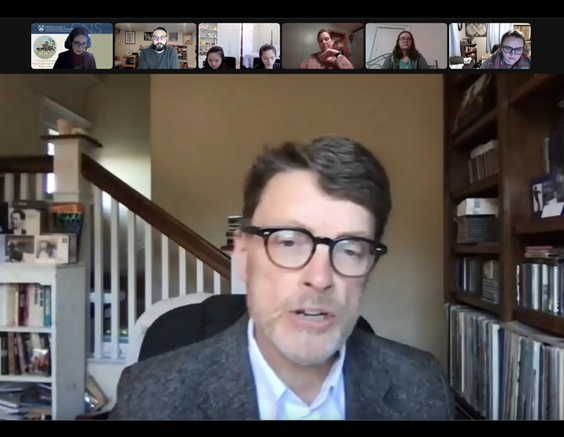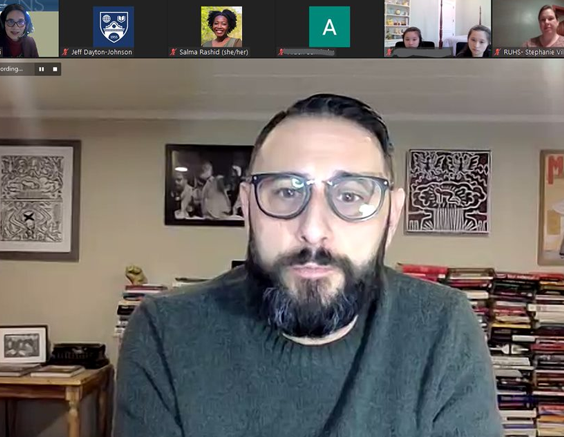Intersection of Racial Justice and Nuclear Disarmament: CNS and MIIS Student Council DEI Committee Cohost the BIPOC Speaker Series Event Featuring Dr. Vincent Intondi
Introduction
On February 22, 2023, the James Martin Center for Nonproliferation Studies (CNS) and the Middlebury Institute of International Studies at Monterey (MIIS) Student Council DEI Committee co-hosted the BIPOC Speaker Series. The featured speaker was Dr. Vincent Intondi, a professor, historian, and author who is widely considered the preeminent authority on the intersection of race and nuclear weapons. His speech, titled, “Intersections of Racial Justice and Nuclear Disarmament” focused on the intersection of race and nuclear weapons and provided an overview of his research on his book, African Americans Against the Bomb. Dr. Intondi’s book examines Black activists who fought for nuclear disarmament and connects the issue of nuclear weapons with the fight for racial equality and liberation movements around the world.
This is the first time that CNS and the MIIS Student Council DEI Committee have co-hosted an event to bring more diversity to nuclear disarmament discussions. A particular focus was placed on bringing together MIIS students from different academic fields. This event was also part of the educational and public outreach activities of the Critical Issues Forum (CIF) project that promotes disarmament and nonproliferation education to diverse groups of high school students around the world.
The event started with an opening statement from CNS Senior Project Manager and Research Associate, Ms. Masako Toki. Ms. Toki gave a brief introduction of CNS education efforts and the goals and activities of the CIF project. Next, Ms. Salma Rashid, Student Council Vice President and Master of Public Administration graduate student at MIIS, introduced the BIPOC Voices at MIIS initiative. Ms. Rashid explained that the initiative is a collaboration at MIIS that is made up of the Student Council, Student Services, Sustainability Council, the Library, the Vice President’s Office, and the Kathryn Wasserman Davis Collaborative in Conflict Transformation Fund. The initiative aims to bring more diverse voices to campus and to enhance student efforts to create lasting institutional change at MIIS.
Next, Dr. Jeff Dayton-Johnson, Vice President for Academic Affairs and Dean of the Institute, warmly welcomed the participants, and expressed gratitude to the speaker and the organizers. Dr. Dayton-Johnson highlighted the significance of focusing on the intersections of nuclear disarmament and racial justice and stated that the collaboration between CNS and the Student Council DEI Committee is very meaningful. Dr. Dayton-Johnson concluded his remarks by stating that the fight for all freedoms, including fight for nuclear disarmament and racial justice, is what the Middlebury Institute aspires to continue to do. The Middlebury Institute is where leaders of the future learn how to fight for all freedoms.

(Dr. Jeff Dayton Johnson addresses the audience)
Dr. Vincent Intondi’s Speech
Dr. Intondi began the presentation with the lifechanging impact of his first visit to Hiroshima and Nagasaki as a young student activist in the black freedom movement. Dr. Intondi elaborated on the persecution of Japanese Americans after the attack on Pearl Harbor and discussed his research on how the African American community responded to the Japanese Americans internment camps and later the atomic bombings against Japan. Many African Americans were deeply opposed to the actions undertaken by the US government against Japanese Americans, and the Japanese people. Black freedom activists saw the connections between colonialism, racism, and nuclear weapons. Dr. Intondi followed up by asking a question, why did the US consider using nuclear weapons against Japan but not against the people of Europe? He argued that this was the result of racially discriminate overtones initiated by US officials in power who, at the time, were predominately white males. Ultimately, people of color in the US have suffered continuous discrimination and violence by being subjugated as second-class citizens.

To illustrate the important role Black Americans played in nuclear disarmament, Dr. Intondi referenced that while the US government continued to increase its nuclear capabilities during the Cold War, many activists launched protests against nuclear weapon development and expansion. Significant numbers of prominent activists came from minority communities. In particular, many of those prominent figures included women and members of the LGBTQ + community who continued to advocate for nuclear disarmament, as well as, better respect for human life.
Dr. Intondi also elaborated on the significance of the Treaty on the Prohibition of Nuclear Weapons (TPNW) as this treaty aims to stigmatize nuclear weapons. The TPNW also provides agency and empowerment to the people. Dr. Intondi passionately asserted that his work is for future generations so that they can live a life free from nuclear weapons. He encouraged young people to contribute for the better future by using their gifts, by suggesting; “You all have gifts. And what you do with it is your gift back. Use your gift to make the world a better place.”
He concluded his speech quoting Dr. Martin Luther King Jr; “the arc of the moral universe is long but it bends toward justice.” Then, Dr. Intondi added the following; “But I would say to the audience tonight, that the arc bends towards justice only if we all grab the arc and bend it ourselves.”
“What we are doing in many ways is not for us. … I am doing it for future generations. I am doing it so that future generations can live a life free from fear of dying from nuclear war. I am doing it so that we can finally eliminate all of the horrible treatment that has happened to the indigenous communities; the Marshall Islands, uranium mining on Native American lands, French Polynesia, the Australian Aborigines, it’s always a people of color.”
—Dr. Vincent Intondi
Questions and Answer Session
After the speech, the audience asked many questions which stimulated a great discussion during the lively Q&A session.
One of the CIF students from Rock University High School asked how to find more information about the intersectionality between nuclear disarmament and racial justice as the resources in this particular field are still scarce. Dr. Intondi shared his experience that he had to start from scratch as this research had previously been limited. While more people have begun talking about this specific intersectionality, he also agreed that more work is still needed in this field.
Dr. Intondi responded to the next question on nuclear disarmament discourse that potentially treats victims of nuclear weapons in hostile countries as “others” or “subhuman”, by emphasizing the danger of such discourse. He commented on the media narrative of how different racial groups are valued unequally and claimed that no human life is expendable. Tragically, we still often witness that people of color are treated as second class citizens and are often “otherized” when tragic events happened. This is particularly dangerous in the context of potential nuclear weapon use.
Several participants in attendance were high school and college students who were curious about how to become more engaged in the nuclear disarmament movement. Dr. Intondi acknowledged that engaging youth in this discussion is much more difficult than engaging youth in discussions on climate movements because nuclear dangers are often not perceived as an intangible threat, and thus are separated from our daily lives. He emphasized the importance of bringing hope to the conversation on nuclear disarmament and to not solely talk about the issue out of fear. He also suggested that connecting other topics with nuclear issues, such as sports and music is a good way to engage younger generations. Dr. Intondi thanked the younger participants who joined the event and insisted that it is important to start engagement with nuclear disarmament at a younger age. Dr. Intondi encouraged the audience to understand that daily acts of resistance against nuclear weapons can increase the movement towards disarmament.
Conclusion
Dr. Intondi’s speech “Intersections of Racial Justice and Nuclear Disarmament” was incredibly powerful and passionate, and inspired the audience that there is something that all of us can do to advocate for nuclear disarmament and racial justice. It was significant to have held this event in February, Black History Month, as a joint effort by the CNS Critical Issues Forum and MIIS Student Council DEI Committee. This joint effort contributed to raising more awareness on both nuclear weapons and racial justice among the public, especially young people, and bringing more diverse voices to these important discussions. Both organizations are determined to continue efforts to work towards a nuclear weapon free world while tackling racial injustice.
We would like to thank the Middlebury College’s Provost’s Academic Council, the Kathryn Wasserman Davis Collaborative in Conflict Transformation Fund, The Tom & Sarah Pattison Fund, the SAGA foundation, Mr. Gregg Wolpert, and the MIIS Students Services for their support.